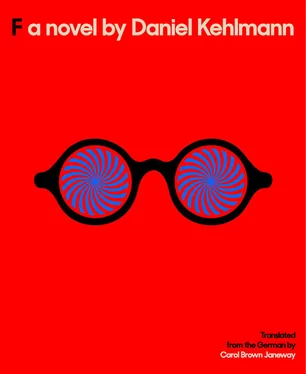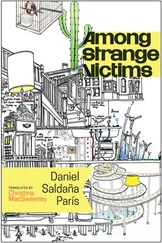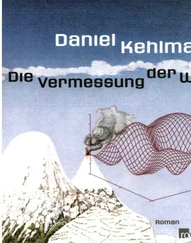“It’s a process.” I cleared my throat. “In matters of faith one is always a traveler. One never …”
“You just don’t want to work!”
I stood up. How did he always manage to make me furious so quickly? How did everything he said ring true, and yet ring true in such a fake way?
“Whenever all the praying gets to be too much for you, you’ll come crawling,” said Eric. “Then you’ll beg me to give you a job.”
“And what will you do then? When I come crawling?”
“Then I’ll give you a job, what else? You’re my brother.” He laughed and went out without saying goodbye.
“He’s been nervous lately,” said Ivan. “He’s not sleeping enough. Don’t take him seriously.” He opened My Name Is No One , thumbed a few pages absentmindedly, and closed it again. “I also believed once that I’d encountered the devil. It was in the department store, I was ten. There was a woman at a bargain counter, she didn’t look in any way unusual, but I knew: If I stay here a few seconds longer, something dreadful is going to happen. Mama didn’t find me until an hour later, I was hiding behind a fridge in the electronics department, she was out of her mind with worry. I still believe I did the right thing. If she’d seen me …” He looked thoughtfully out the window. A gardener was trimming the hedge outside, the shears glinted in the sunlight. “But it’s all crazy. I was ten.” He looked at the table-tennis table, then at me, as if he’d forgotten for a moment that I was there. “And otherwise? Goals, plans? That’s what birthdays are for. Resolutions?”
“I’m training for the championships.”
“The cube again?”
“The cube.”
“Good luck. But more important …”
“Yes?”
“Nothing.”
“Say it!”
“Well, somebody’s got to. As long as there’s time to do something to stop it. You should …”
“Yes?”
“Never mind.”
“Say it!”
“Go on a diet, my pious brother! There’s still time, but later it’ll just get harder. You really need to lose weight.”
Is My Name Is No One a merry experiment and thus the pure product of a playful spirit, or is it a malevolent attack on the soul of every person who reads it? No one knows for sure, maybe both are true.
The opening sets up an old-fashioned novella about a young man embarking on his life. All we know about his name is its first initial: F. The sentences are well constructed, the narrative has a powerful flow, the reader would be enjoying the text were it not for a persistent feeling of somehow being mocked. F is put to the test, he defends himself, fights, learns, wins, learns more, loses, and develops as he moves on, all in the grand old manner. But there is a sense that no sentence means merely what it says, that the story is observing its own progress, and that in truth the protagonist is not the central figure: the central figure is the reader, who is all too complicit in the unfolding of events.
Slowly but surely the little discrepancies accumulate. F is home, looking out at the rain, puts on a jacket and cap, takes his umbrella, leaves the house, wanders through the streets, where it isn’t raining, puts on a jacket and cap, takes his umbrella, and leaves the house, as if he hadn’t just done that already. Shortly after that a distant relative appears, who has already been registered in a subordinate clause as having died ten years ago, an innocent visit to the fair by a grandfather and his grandson turns into a labyrinthine nightmare, and a piece of clumsiness on F’s part with major consequences is wound backward until it clearly never happened. Of course this all leads to the construction of theories. Very slowly there comes a dawning sense of comprehension, then the realization of being on the brink, and then the story breaks off — just like that, without warning, right in the middle of a sentence.
The reader keeps trying to make sense of it all. Perhaps the hero died. Perhaps the inconsistencies are harbingers of the end, the first defective spots, so to speak, before the entire warp and woof unravels. For what, the author seems to be asking, is death, if not an abrupt break in the middle of a sentence which the reader cannot elide, a soundless apocalypse in which it isn’t humanity that disappears from the world, but the world itself that disappears, an end of all things that has no end?
The second half is about something else. Namely that you, yes, you, and this is no rhetorical trope, you don’t exist. You think you’re reading this? Of course you do. But nobody’s reading this.
The world is not the way it seems. There are no colors, there are wavelengths, there are no sounds, there are vibrations in the air, and actually there is no air, there are chains of atoms in space, and “atoms” is just an expression for linkages of energy that lack either a form or a fixed location, and what is “energy” anyway? A number that remains constant throughout all changes, an abstract sum that remains inalterable, not substance, not ratio: pure mathematics. The more attentively one looks, the emptier it all is, and the more unreal that emptiness is. For space itself is no more than a function, a model of our minds.
And the mind that creates these models? Don’t forget: nobody inhabits the brain. No invisible being wafts through the nerve endings, peers through the eyes, listens from within the ears, and speaks through your mouth. The eyes are not windows. There are nerve impulses, but no one reads them, counts them, translates them, and ruminates about them. Hunt for as long as you want, there’s nobody home. The world is contained within you, and you’re not there. “You,” seen from inside, are cobbled together on a makeshift basis: a field of vision amounting to no more than a few millimeters, and already dissolving into nothing at the outer edges, containing blind spots, and filled with mere habit and a memory that retains very little, most of it invented. Consciousness is a mere flicker, a dream that nobody is dreaming.
There are fifty pages of this stuff, and it more or less works, you’re more or less convinced. It’s just that there’s a creeping sort of feeling that this too is an ironic demonstration of — well, what? You’re already on the final chapter. It’s short and it’s merciless, and there can be no doubt — it’s all about Arthur himself.
F appears again and a human being is dismembered in the course of a few pages: gifted, gutless, vacillating, egocentric to the point of sheer meanness, self-loathing, already bored by love, incapable of engaging seriously with anything, using everything including art as a mere excuse for doing nothing, unwilling to take an interest in anyone else, incapable of taking responsibility, too cowardly, incapable of facing his own failures, a weak, dishonest, superfluous man, good for nothing except empty mind games, bogus art lacking all substance and the silent evasion of every unpleasant situation, a man who has finally reached the point of such aversion to his own self that he has to assert that there is no such thing as a self.
But even this third part is not as clear as it seems. Is this self-loathing really genuine? Given the representations above, there is no “I,” and this entire exploration of consciousness is meaningless. Which part supersedes which other part? The author gives no indication.
Ivan, Eric, and I had each received a copy through the mail, wrapped in brown paper, minus dedication or sender’s details. The book was not reviewed anywhere, and I didn’t see it in any shop. It was an entire year before I saw it on the street. I was on my way home from school, and for a moment I thought what I was seeing was pure fantasy. But there it really was, in the hands of an old man on a bench who was holding it and smiling as he read it, obviously captivated by the question of the reality of his own existence. I bent over and looked at the plain blue cover, the man looked up uneasily, and I hurried away. Two weeks later I saw the book again, this time in the subway, a man with a leather briefcase and a raggedy hat was reading it. When I saw it again the next week, it was all over the newspapers, and the first people had already killed themselves over it.
Читать дальше











